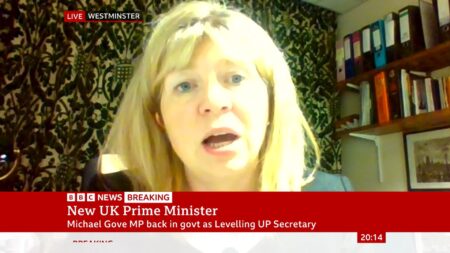It’s Monday morning, 10.30am, British Summer Time, just, and the Tories are gifting (read ‘inflicting on’) us another Prime Minister. I know it’s hard to keep count, but since the Brexit vote under David Cameron in 2016, we have had four further prime ministers (May, Johnson, Truss, Sunak), three in the last two months (let me repeat that: three in the last two months). Unfortunately, they were all from the same party, and so their policies were, in the rough, quite similar: shrink the state, blame powerless people for things that have nothing to do with them, and reduce public services to the bone. The effects of these policies are stark: charities increasingly stepping into the breach left by policy, supporting local citizens who struggle to eat, heat their homes and/or find jobs in a job market that has become removed from them as things such as job applications have migrated into the digital world which a significant proportion of them cannot access or navigate. At the same time, these charities are now facing closure as horrendous energy bills threaten their viability.
What, do you say, does any of this have to do with public service broadcasting? A lot. For years, political commentators have bemoaned the decreasing number of people who vote or are in other ways politically active (Fawcett et al., 2017), and for years, media scholars have pointed to the problems facing public service broadcasting, including diminishing viewer numbers (Freedman, 2018). The assumption of some political commentators (see Fawcett et al, 2017) has been that people are becoming politically disengaged. But the opposite is true: people are political, but they have lost faith in a politics that decides everything from the top and disempowers them in the process. Look at the current Tory leadership-yet-again debacle. Very few people get a say who our next prime minister will be, and, as one woman said, ‘it’s a bit embarrassing’. And while ordinary people struggle with their energy and food bills, the media continue to focus on the ‘soap opera’ (as Keir Starmer puts it, somewhat mechanically) that the leadership contest brings because they know that the high stakes creates the drama that brings in the viewers. And that means, it’s not just the Tories who ignore the worries of ordinary people.
The public service broadcasters in the UK, in particular the BBC and Channel 4, have remits that require them to ‘reflect, represent and serve the diverse communities of all of the United Kingdom’s nations and regions’ (BBC, Public Purposes) and ‘to champion unheard voices’ (Channel 4’s remit). But sometimes I am not sure they take it all that seriously. In order to hear about the struggles and incredible resilience of people in the North East of England, I am currently watching Ambulance (BBC, 2016-) which is, at the face of it, not about that. Similarly, in order to get stories about Wales told, Welsh producers have often opted to use the ‘most popular genre’ on television (see Hansen et al, 2018), the crime drama. That they have to do that is utterly frustrating to them.
Speaking to Ed Thomas (personal interview, 2022), head of Fiction Factory, made this frustration particularly visible. He told me about his programme, Pen Talar (S4C, 2010) which he conceptualised as a Welsh version of Heimat (ARD, 1984, 1993, 2004, 2006 and 2013). The issue was, when talking to the BBC in development, that he needed to provide so much context because the knowledge about Wales and its specific cultural and political history was just not there. He urged for a more devolved form of the BBC that would allow for, as he put it, the creation of ‘the muscle for a whole panoply of expression.’ While Thomas undoubtedly spoke in part from a frustration of struggling to make the programmes he wanted to make, what his point makes visible is that there is a real perceived lack of self-representation that would be meaningful to local citizens.
This self-representation is important not just because it would champion the (currently) unheard voices and represent the diverse communities across all of the United Kingdom, but also because it is precisely that self-representation that gives local communities who are currently stepping into the breach left by government the validation that keeps them going and brings in new volunteers. In our research project on local television and local communities (Weissmann and Tyrrell, 2022), the screening of films about local communities brought about the affective change in audiences that gave them the energy to continue the work they were doing. In addition, others felt encouraged to become involved too. Thus, public service television, when it takes its remit seriously, can support local efforts and engage local citizens to be active, and it does this by giving local communities a sense of pride and self-worth, positive emotions that are even more vital today when so much is focused on the cost-of-living crisis and other difficult experiences. As the work of Sarita Malik et al. (2018) shows, however, this needs to be community-led, rather than by drawing on a paternalistic approach: what is needed is an approach where communities lead the productions, rather than producers coming in and, although well-meaning, bringing their own assumptions about what makes good television and how narratives should be told. While the professional skills of production crew are certainly important, they need to build on what the community has to say about itself rather than impose ideas of what it is like onto them: such an approach can often lead to charges of ‘poverty porn’ and concerns of misrepresentation, as the case of Benefits Street (Channel 4, 2014-2015) highlighted.
https://youtube.com/watch?v=eTy3oUOIATk
A revised public service television, then, could be part of a changed political infrastructure. An infrastructure that is based on locality, devolving more and more power away from Westminster into regions and counties. A focus on local communities could tackle the distinct problems more succinctly, but this requires us to validate the local communities as what they are – and thus handing over aspects of their representation to a more devolved form of public service television too. But it is public service television – because it needs to – that really provides that representation: if we look at Welsh television, for example, Netflix may have a big hit with Sex Education (2019-) on their hands, but you may be forgiven if you weren’t even quite sure it was set in the UK, let alone Wales, as a result of how the school kids dress (where’s their uniform?). It is dramas like Hinterland/Y Gwyll (S4C, BBC, 2013-2016) and Keeping Faith (S4C, BBC, 2017-2021) that speak to and about specific elements of Welsh local experiences; while The Green Hollow (BBC, 2016) tells the story of the Aberfan Disaster from the point of view of survivors, rather than a queen who struggles to cry (see also Pearson, 2020). Thus, although public service broadcasters may not always manage to deliver on their remit as much as we would like them to, they do a good bit better than others. And as the case of Netflix in relation to Welsh television makes visible, they do significantly better than transnational or near-global corporations who are more driven by international subscriber numbers than a remit or duty to reflect the diverse and unheard voices of the people they are meant to serve.
Elke Weissmann is Reader in Film and Television at Edge Hill University. She’s in the process of untangling her thoughts based on two research projects the British Academy were kind enough to fund. One looked at Transnational Television Drama in the Multiplatform Age, the other at Local Television, Local Communities and Climate Action.




